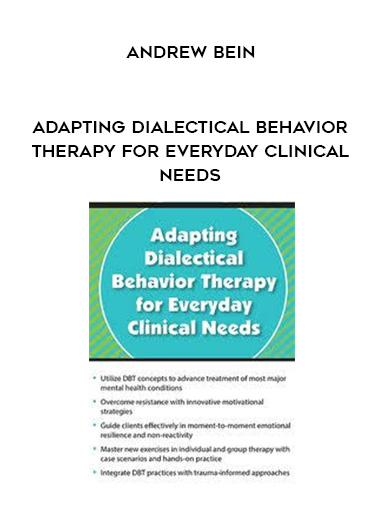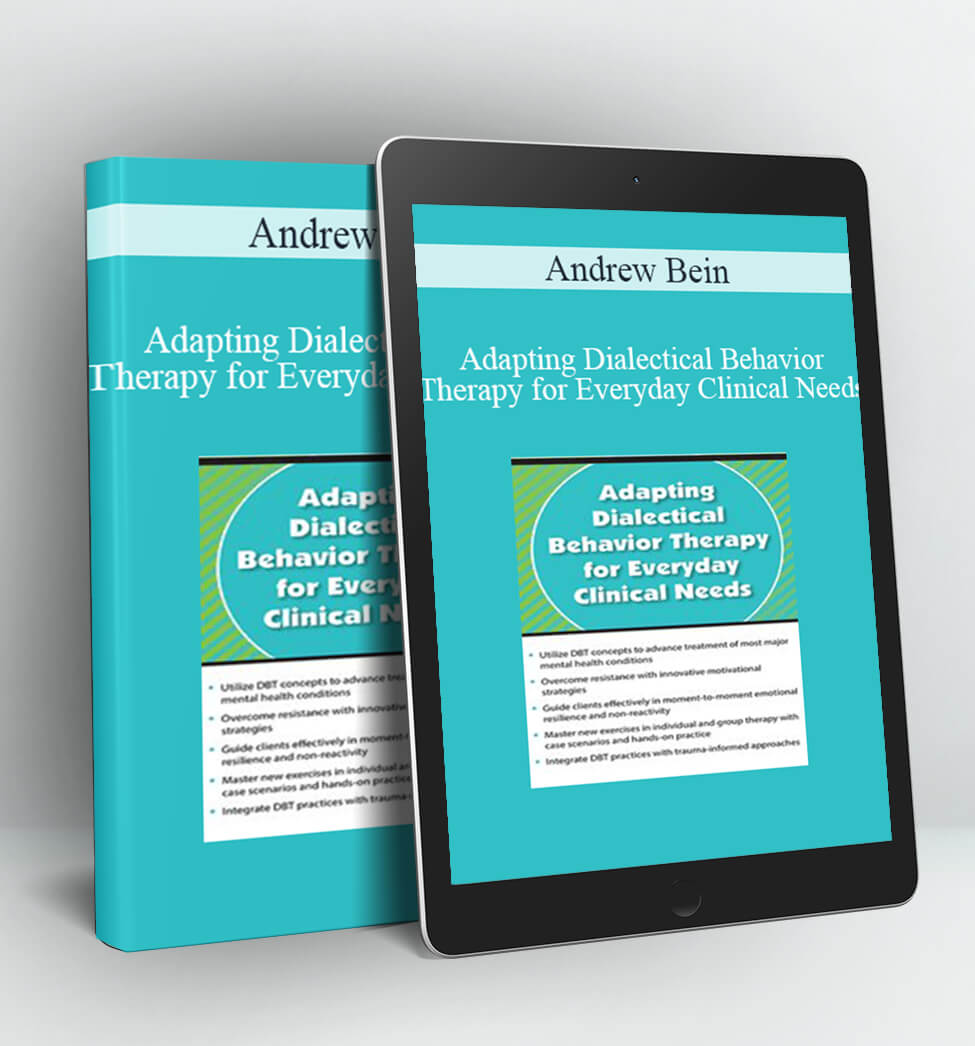
Adapting Dialectical Behavior Therapy for Everyday Clinical Needs – Andrew Bein
The Game-Changing Guide to Integrating DBT in Your Practice
For clients who struggle to regulate and cope with their emotions, Dialectical Behavior Therapy (DBT) can bring about lasting behavioral change – even if they aren’t diagnosed with Borderline Personality Disorder. Learn to adapt DBT to meet the needs of your practice and advance your clients’ treatment goals across a wide spectrum of behavioral health conditions. This recording will teach you to direct growth in each of the DBT skill areas (emotion regulation, mindfulness, interpersonal effectiveness, and distress tolerance) and guide efforts in moment-to-moment resilience and non-reactivity.
Led by Dr. Andrew Bein, a seasoned instructor with an energetic, hands-on approach to education, you will quickly master strategies for enhancing motivation and strengthening client engagement, as well as explaining the theory and science of DBT accessibly to clients. By the end of the recording, you will have the tools necessary to integrate DBT immediately into your practice and help your clients finally take control of their emotions and their lives.
- Describe the four skill modules and skill-based strategies for regulating emotions and maintaining safety in a clinical setting.
- Adapt DBT for a range of patient and clinical needs in any setting as it relates to clinical Treatment.
- Apply clinical interventions that reinforce DBT skills to improve client level of functioning.
- Design successful logging methods and “homework” for purposes of client psychoeducation.
- Demonstrate use-of-self competence to enhance DBT effectiveness and put to practical use in-session.
- Integrate DBT principles into clinical practice in conjunction with other interventions.
Get Adapting Dialectical Behavior Therapy for Everyday Clinical Needs of author Andrew Bein
Dialectical Behavior Therapy
- Dialectics
- DBT vs. CBT
- DBT in individual therapy
- DBT in group therapy
- Hierarchical skill instruction
- Supporting research
- Limitations of practice and risk
The Four Modules Of DBT Skills
- Mindfulness
- Distress tolerance
- Emotion regulation
- Interpersonal effectiveness
Foundations For Powerful Client Interventions
- Describe DBT principles and neuroscience accessibly to clients
- Unify concepts
- Build upon and refine concepts and skills session-to-session
- Flatten the clinician-client hierarchy
- Connect with client trauma
- Enhance internal motivation
- Strengthen skillful response and personal resilience
The Client’s Wise Mind Process
- Intention
- Acceptance and culturally competent equivalents
- Improve the moment for emotion regulation and safety
- Expand the moment to strengthen connection
- Cultivate self-compassion, an emotion regulation oasis
- Use Wise Mind diagrams for clients
Key Client Exercises
- Effectively teaching mindfulness exercises
- Face emotions and thoughts, improving the moment
- Deal with judgments
- Deal with difficult times: distress tolerance plan
- Expand the moment (inclusive “bigger picture” or spiritual strategies)
- Work with client logs and assignments
Moving Beyond Theory: How To Integrate Principles In Your Practice
- Applications for diverse clientele
- Adapt DBT to your practice setting
- Strategies for effectively incorporating DBT
- DBT work side-by-side with other interventions
- Maintain practitioner radical acceptance and mindfulness in the midst of emotional intensity
- Discuss case scenarios
Please Note: PESI is not affiliated or associated with Marsha M. Linehan, PhD, ABPP, or her organizations.





